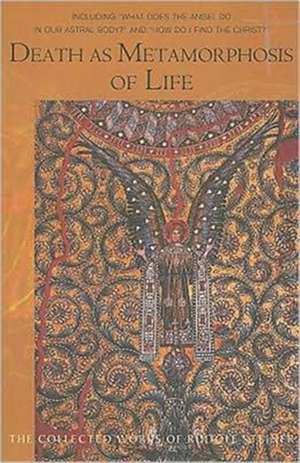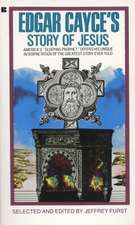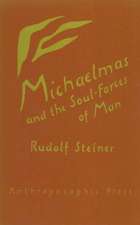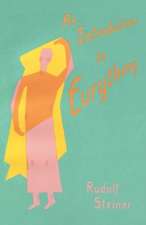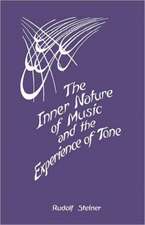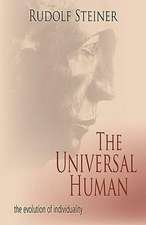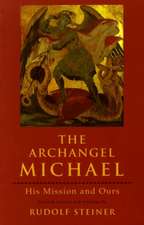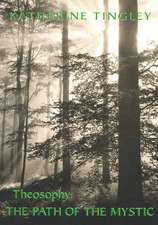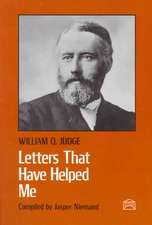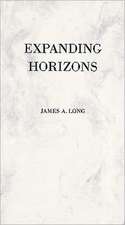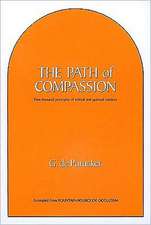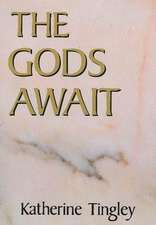Death as Metamorphosis of Life: Collected Works of Rudolf Steiner, cartea 182
Autor Rudolf Steineren Limba Engleză Paperback – 17 iul 2008
How can we find the Christ? Steiner quotes the seventeenth-century mystic, Angelus Silesius: The Cross on Golgotha cannot save you from evil if it is not also raised within you. * * *"Death as Metamorphosis of Life" is translated for the first time in its entirety from the German of "Der Tod als Lebenswandlung" (GA 182). Individual lectures have appeared in "Angels: Selected Lectures; Evil: Selected Lectures;" and "Staying Connected.""
Din seria Collected Works of Rudolf Steiner
-
 Preț: 213.21 lei
Preț: 213.21 lei -
 Preț: 260.45 lei
Preț: 260.45 lei -
 Preț: 258.76 lei
Preț: 258.76 lei -
 Preț: 151.75 lei
Preț: 151.75 lei -
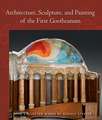 Preț: 277.41 lei
Preț: 277.41 lei -
 Preț: 154.46 lei
Preț: 154.46 lei -
 Preț: 136.35 lei
Preț: 136.35 lei -
 Preț: 215.68 lei
Preț: 215.68 lei -
 Preț: 108.47 lei
Preț: 108.47 lei -
 Preț: 136.86 lei
Preț: 136.86 lei -
 Preț: 115.84 lei
Preț: 115.84 lei -
 Preț: 136.49 lei
Preț: 136.49 lei -
 Preț: 135.09 lei
Preț: 135.09 lei -
 Preț: 108.26 lei
Preț: 108.26 lei -
 Preț: 110.47 lei
Preț: 110.47 lei -
 Preț: 101.01 lei
Preț: 101.01 lei -
 Preț: 143.00 lei
Preț: 143.00 lei -
 Preț: 258.66 lei
Preț: 258.66 lei -
 Preț: 101.17 lei
Preț: 101.17 lei -
 Preț: 151.68 lei
Preț: 151.68 lei -
 Preț: 151.02 lei
Preț: 151.02 lei -
 Preț: 115.58 lei
Preț: 115.58 lei -
 Preț: 257.55 lei
Preț: 257.55 lei -
 Preț: 152.25 lei
Preț: 152.25 lei -
 Preț: 152.00 lei
Preț: 152.00 lei -
 Preț: 136.86 lei
Preț: 136.86 lei -
 Preț: 224.10 lei
Preț: 224.10 lei -
 Preț: 225.17 lei
Preț: 225.17 lei -
 Preț: 259.91 lei
Preț: 259.91 lei -
 Preț: 217.78 lei
Preț: 217.78 lei -
 Preț: 184.77 lei
Preț: 184.77 lei -
 Preț: 194.89 lei
Preț: 194.89 lei -
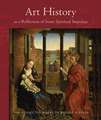 Preț: 280.29 lei
Preț: 280.29 lei -
 Preț: 135.88 lei
Preț: 135.88 lei -
 Preț: 153.89 lei
Preț: 153.89 lei -
 Preț: 152.86 lei
Preț: 152.86 lei -
 Preț: 135.32 lei
Preț: 135.32 lei -
 Preț: 145.05 lei
Preț: 145.05 lei -
 Preț: 151.47 lei
Preț: 151.47 lei -
 Preț: 152.25 lei
Preț: 152.25 lei -
 Preț: 115.98 lei
Preț: 115.98 lei -
 Preț: 100.76 lei
Preț: 100.76 lei -
 Preț: 216.88 lei
Preț: 216.88 lei -
 Preț: 226.35 lei
Preț: 226.35 lei -
 Preț: 151.47 lei
Preț: 151.47 lei -
 Preț: 154.81 lei
Preț: 154.81 lei -
 Preț: 217.05 lei
Preț: 217.05 lei - 5%
 Preț: 145.87 lei
Preț: 145.87 lei -
 Preț: 151.75 lei
Preț: 151.75 lei
Preț: 121.95 lei
Nou
Puncte Express: 183
Preț estimativ în valută:
23.34€ • 24.95$ • 19.46£
23.34€ • 24.95$ • 19.46£
Carte disponibilă
Livrare economică 27 martie-10 aprilie
Livrare express 12-18 martie pentru 24.19 lei
Preluare comenzi: 021 569.72.76
Specificații
ISBN-13: 9780880106078
ISBN-10: 0880106077
Pagini: 194
Ilustrații: frontispiece
Dimensiuni: 155 x 233 x 15 mm
Greutate: 0.35 kg
Editura: Steiner Books
Seria Collected Works of Rudolf Steiner
ISBN-10: 0880106077
Pagini: 194
Ilustrații: frontispiece
Dimensiuni: 155 x 233 x 15 mm
Greutate: 0.35 kg
Editura: Steiner Books
Seria Collected Works of Rudolf Steiner
Notă biografică
Rudolf Steiner (1861-1925) was born in the small village of Kraljevec, Austro-Hungarian Empire (now in Croatia), where he grew up. As a young man, he lived in Weimar and Berlin, where he became a well-published scientific, literary, and philosophical scholar, known especially for his work with Goethe's scientific writings. At the beginning of the twentieth century, he began to develop his early philosophical principles into an approach to systematic research into psychological and spiritual phenomena. Formally beginning his spiritual teaching career under the auspices of the Theosophical Society, Steiner came to use the term Anthroposophy (and spiritual science) for his philosophy, spiritual research, and findings. The influence of Steiner's multifaceted genius has led to innovative and holistic approaches in medicine, various therapies, philosophy, religious renewal, Waldorf education, education for special needs, threefold economics, biodynamic agriculture, Goethean science, architecture, and the arts of drama, speech, and eurythmy. In 1924, Rudolf Steiner founded the General Anthroposophical Society, which today has branches throughout the world. He died in Dornach, Switzerland.
